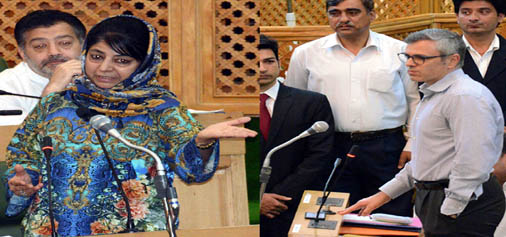
Sanjeev Pargal
JAMMU, June 6: Total cost of Sawlakote hydro-electric power project, which the State Government proposed to construct over river Chenab between Baglihar and Salal projects, has shot up to Rs 16,359 crores and could go up further if deadline of seven and a half years, fixed for its construction, was not met.
The 1856 mw power project is being constructed by Jammu and Kashmir State Power Development Corporation (JKSPDC) and the State Government had recently signed Memorandum of Understandings (MoUs) with two companies worth Rs 218 crores for construction of 1.5 kilometers long tunnel and a steel bridge as access to the project site.
Official sources told the Excelsior that cost of Sawlakote power project, which was first conceived in 1997 but ground work on which started only in 2001, had total cost of Rs 1926.25 crores initially but, as the project was mired in several disputes like construction by the companies, legal etc, the revised cost of the project now has been projected at Rs 16,359 crores, which was inclusive of Rs 10,475 crores hard cost.
The JKSPDC has submitted the Detailed Project Report (DPR) of Sawlakote to the Central Electricity Authority of India (CEAI). Work on the project can be started only after the CEAI approval and construction of access road including the tunnel, whose work has been assigned to Hindustan Construction Company (HCC) and steel bridge, which will be constructed by M/s Singla Constructions Private Ltd.
Sources said clearance from Defence Ministry and all Departments of the State Government has been received for construction of the project while it (the clearance) was awaited from Ministry of Environment and Forests apart from Techno Eco Clearance. The JKSPDC was hoping clearance from the Ministry of Environment and Forests shortly.
According to sources, pre-construction work on the project was expected to take one year while the project itself could take seven and half years if everything goes well including regular funding, which was an uphill task.
“Any further delay in the project had the potential of further jump in the cost,” they admitted.
Sources said it was mainly due to massive delay in construction of the project that its initially proposed cost of Rs 1926.25 crores has now jumped to Rs 16,359 crores with all possibilities of further escalation as work on even access road to the project was going to start now with the signing of MoUs between State Government and two construction companies.
A run of the river project located between State owned Baglihar and NHPC-run Salal on Chenab river at village Ghalot falling in Udhampur district but activities in adjoining Ramban district, Sawlakote remained mired in controversy since 1997 when the then NC Government offered it to limited bidding.
On basis of its offer to arrange 85 per cent of the project cost through export credit and completing the project in 78 months, State run Power Development Corporation (PDC) entered into an MoU with Norwegian Statkraft Anlegg / Kvaerner Energy in July 1999.
However, in 2000 when another Norwegian major NCC International bought Statkraft Anlegg, it floated NCC-led Sawlakote Consortium and within 17 months optimized the project layout and presented the DPR with an EPC contract on December 1, 2000. PDC got its techno-economic appraisal through Lahmeyer International, its technical advisers on Baglihar.
On April 19, 2001 the two sides signed an agreement in presence of visiting Norwegian Prime Minister in Delhi much to the discomfort of Union Power Ministry, which was keen that NHPC bags the project. Then, NCC was supposed to set up 600 mw first phase at a cost of Euro 517 millions and Rs. 986 crores. It also offered completing of next phase of 600 MW for an additional Euro 204 millions. Then, the entire 1200-MW project would cost PDC Rs 4879.40 crores that was perhaps the cheapest of the energy in Asia.
By the time new Government was formed in 2002, German construction major Hochtief AG that was NCC’s original partner in the consortium withdrew. As the NCC and the new Government started picking up the threads, re-evaluation of the whopping investment became inevitable. After a series of meetings with State’s policy makers SPAS – NCC’s special purpose company to lead the Sawlakote Consortium- signed a fresh contract on February 3, 2005 for setting up entire 1200-MW project at a cost of euro 415 million and Rs 1,926.25 crore. The reappraisal saved over Rs. 700 crore.
Officials associated with the exercise said the cost-reduction was the outcome of restructuring the entire project and Indianising it by taking Indian HCC and Turkish Ozaltin as two other partners in place of more expensive Germans. PDC saved money on three counts – reduction in direct costs, devaluation of rupee and preventing exchange risk by reducing expatriate costs, implementing a more favourable currency mix and adopted the innovative mezzanine financing. State’s equity participation was increased from 15 to 30 per cent and the export credit was reduced to around 30 per cent as the balance requirement was to be managed in the domestic market through the Power Finance Corporation. The agreement was finally signed on December 20, 2005 and projected as the best deal done ever.
Within few months, the Government decided against the deal.
Now, the project is with the JKSPDC.

